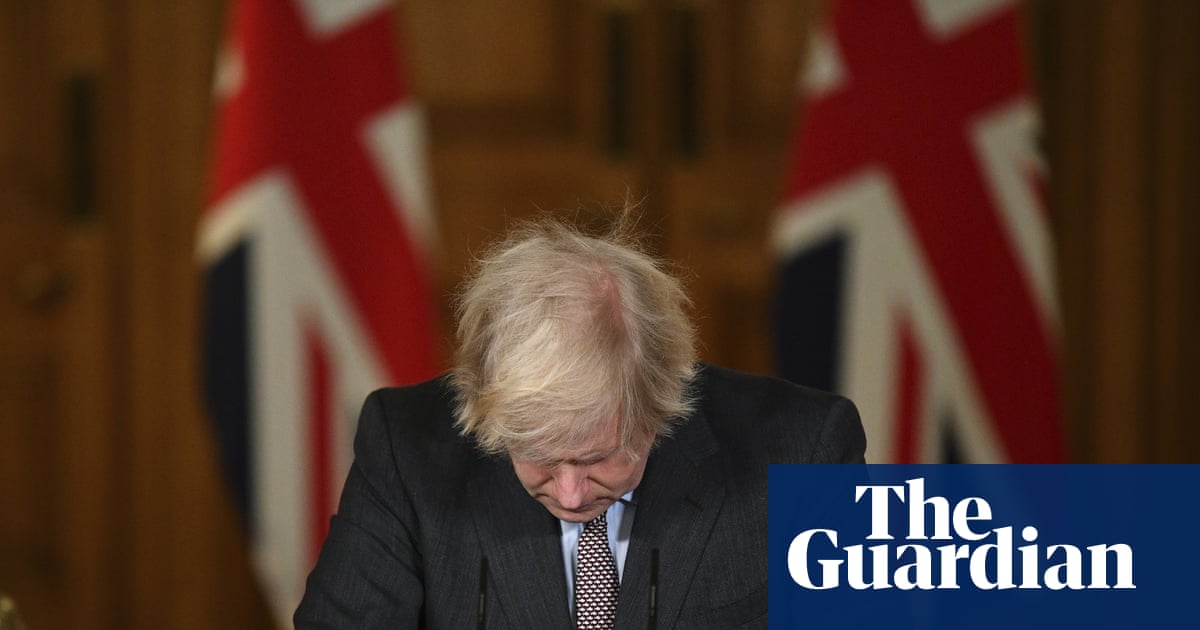The UK’s response to Covid was “too little, too late”, a damning official report on the handling of the pandemic has concluded, saying the introduction of a lockdown even a week earlier than happened could have saved more than 20,000 lives.
The document also has stinging criticism of a “toxic and chaotic” culture inside Boris Johnson’s Downing Street – which it said the then prime minister actively embraced – in which the loudest voices held sway and women were sidelined.
Detailed in more than 750 pages across two volumes, the findings of the second part of the Covid inquiry’s hearings, on how government handled the pandemic, paint a consistent picture of delay, inaction and a seeming inability to learn lessons.
The narrative about the start of the pandemic in early 2020 is particularly brutal, describing February as “a lost month”. It questions why Johnson failed to chair a single meeting of the Cobra emergency committee that month, noting also that the response to Covid essentially halted during the half-term holiday week.
While acknowledging that the decision to impose a lockdown was unprecedented and hugely difficult, taking other action to curb the spread of the virus sooner could have meant one might have been avoided, or at least have been shorter, it says.
If a lockdown had been imposed on 16 March, a week earlier than took place, modelling suggests this could have cut the number of deaths in England in the first wave of the virus by almost half, equating to 23,000 lives saved, the inquiry authors say.
While perhaps the most stinging criticism is directed at Johnson and his team, notably his then adviser Dominic Cummings, described as central to a “culture of fear” inside No 10, the report also targets the three devolved governments, and others central to the process, such as scientific advisers.
“The inquiry finds that the response of the four governments repeatedly amounted to a case of ‘too little, too late’,” it reads.
If lockdown had been imposed a week earlier up to 23,000 lives could have been saved, the report says. Photograph: GarethWilley/Shutterstock
“The failure to appreciate the scale of the threat, or the urgency of response it demanded, meant that by the time the possibility of a mandatory lockdown was first considered it was already too late and a lockdown had become unavoidable.”
Many of the same mistakes – reacting too slowly and underestimating the speed and impact of Covid’s spread – were then repeated later in 2020, as restrictions were lifted and then belatedly reimposed in the face of infectious new strains, the report adds, calling this “inexcusable”.
The first volume of the report gives a chronology of the crisis, from the start of 2020 to the final lifting of restrictions, pointing to a consistent picture of inaction despite ever-mounting evidence about a new virus that was spreading around the globe and could be transmitted between people.
Events such as the early Covid crisis in Italy “should have prompted urgent planning across the four nations”, the report said, adding: “Instead, the governments did not take the pandemic seriously enough until it was too late. February 2020 was a lost month.”
While there is nothing to mandate that Cobra is always chaired by a PM, it was “surprising” that Johnson did not do this before March, the authors say, with some understatement.
“Mr Johnson should have appreciated sooner that this was an emergency that required prime ministerial leadership to inject urgency into the response,” concludes the inquiry, chaired by retired judge and cross-bench peer Heather Hallett.
This was explained in part by the PM “acting in accordance with his own optimistic disposition” and accepting assurances that everything necessary was being done. Many of these assurances came from Matt Hancock, the health secretary, described by the report as having as reputation “for overpromising and underdelivering”.
During the February half-term, Johnson spent the whole week at the government’s Chevening country retreat, the report says, adding: “It does not appear that he was briefed, at all or to any significant extent, on Covid-19 and he received no daily updates.”
By the second week of March, the report says, the situation was “little short of calamitous”, with no proper plan, no testing taking place and thus no understanding about how far the virus had spread.
But a lockdown was still delayed, in part because of warnings from scientific advisers Chris Whitty and Patrick Vallance about the likelihood of “behavioural fatigue”, meaning people would only comply for a period. This concept, the report said, “had no grounding in behavioural science and proved damaging, given the imperative to act more decisively and sooner”.
Even after a lockdown was imposed on 23 March, the report says, mistakes were repeated, including what it calls an “unwise” exit from restrictions that summer, pushed in part by Rishi Sunak, the then chancellor.
When a second wave swept the UK, a new lockdown was again delayed, with all the four UK governments saying restrictions could ease over Christmas, giving people “false hope”, as the report puts it.
The second volume of the report takes a thematic approach, detailing failures in expert advice, communication with the public and the impact on vulnerable groups.
With advice, the inquiry warns that this was at times hampered by the slightly ad hoc nature of the Sage system, while it says the quality of economic modelling seemed notably poor.
On communications, it says that while the initial, “stay at home” advice was easy to follow, later restrictions, particularly localised ones, were notably harder to understand.
